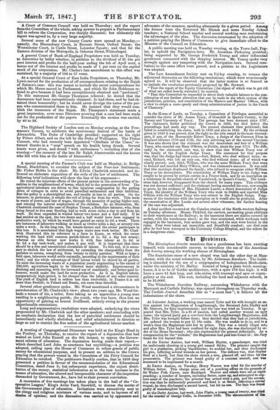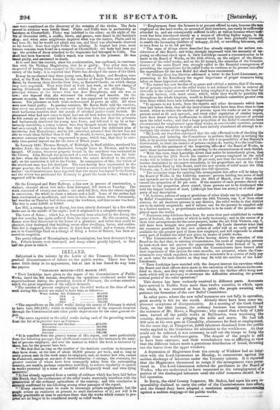ebt Vrobincts.
The Birmingham Gazette mentions that a gentleman has been exerting himself, with considerable success, to introduce the use of the American dish hominy among the working classes of Birmingham.
The foundation-stone of a new chapel was laid the other day at Man- chester, with the usual solemnities, by Mr. Alderman Kershaw. The build- ing is intended for the use of a congregation of Independent Methodists, under the ministry of Dr. Halley. Instead of being a plain brick meeting- house, it is to be of Gothic architecture, with a spire 170 feet high: it will have a nave 91 feet long, and side-aisles, with transept and apse or organ- gallery at the end. The cost, including the land and adjacent schools, is to be 21,0001.
The Whitehaven Junction Railway, connecting Whitehaven with the Maryport and Carlisle Railway, was opened throughout on Thursday week. The Carlisle Journal describes this as " a coast line "; it follows all the indentations of the shore.
At Leicester Assizes, a working man named Tyler and his wife brought an ac- tion against two Magistrates of Loughborough, the Reverend John Dudley and Mr. Danvers, for false imprisonment; and the case was tried on Tuesday. It ap- peared that Mrs. Tyler, in a fit of passion, had called another woman an ugly name; the injured party got a warrant from the Loughborough Magistrates, and Mrs. Tyler was brought before them; they decided that they had no jurisdiction, yet ordered the woman to pay 11. 18s. costs. She was unable to do so, and in a week's time the Magistrate sent her to prison. This was a totally 'illegal act; and after Mrs. Tyler had been confined for eight days, she was discharged by or- der of the Home Secretary; who also reprimanded the present defendants. As a compensation for the "mistake," the Magistrates had paid into Court 5L : the Jury found for 151. beyond this.
At the Exeter Assizes, last week, William Hayter, a gamekeeper, was tried for maliciously shooting at a young girl named Hicks. The prisoner caught the girl in a plantation, picking blackberries; he scolded her, and then discharged his gun, inflicting several wounds on her person. The defence was, that Haytar
Fred at in a hawk, but that the shots struck a tree, glanced off, and thus hit the proeecntrix. The prisoner was found guilty of a common assault, and was sentenced to be imprisoned for a month.
At Exeter Assizes, on Tuesday, Henry Warren was tried for the murder of William Setter. This charge arose out of a poaching affray on the grounds of Sir Walter Polk Carew, near Buckland. Warren and others were out at night poaching; a number of keepers, including Setter, came up, and attempted to cap- ture some of the poachers; the prisoner was armed with a gun, and the accusa- tion was that he deliberately presented and fired it at Setter, inflicting a mortal wound; he then discharged a second barrel, but hit no one. The man was found guilty of manslaughter only. At the Derby Assizes, last week, John Pleas, aman of twenty, was tried for the murder of George Collis, in December 1846young . The circumstances of the was were mentioned on the discovery of the remains of the victim. The facts peoved in evidence were briefly these. Platte and Collis were in partnership as ttasciac at Chesterfield; Plaits was indebted to the other; on the night of the 7th of December 1845, a scuffle, blows, and groans, were heard in the butcher's shop; and when some neighbours inquired what was the matter, Platte said he had been ill; but he would not admit any one, and blood was afterwards observed on his hands: from that night Collis was missing. In August last year, some hessian remains were found an a cesspool at Chesterfield; the body had been cut been
the articles of dress attached to the fragments had belonged to Collis. The * nil bad been fractured. CoWs's watch was traced to the prisoner. He was feted guilty, sad sentenced to death.
it is said that the convict, since his condemnation, has confessed, in conversa- tion with the Visiting Magistrates, that he is guilty. Two other men were suspected of having been engaged in the crime: one of them died before the dis- covery of the body; it is reported that Platte has divulged the name of the third.
It may be recollected that three young men, Barker, Rains, and Breakon, were tried, at the York Winter Assizes, for the murder of Joseph Yates and Catherine Maine, by throwing them into the river Tees, at Barnard Castle; on which charge they were acquitted. They were tried at York last week, on the new charge of Laving feloniously assaulted Yates and rubbed him of ten shillings. The principal witness at the former trial was Ann Humphreys, and she was so ROW: She deposed that she witnessed the robbery and murder. On the present eteasion, her evidence was more or less supported by twelve other wit- maces. The prisoners on both trials endeavoured to prove an alibi. All three were now found guilty. In passing sentence, Mr. Baron Rolfe told the convicts, that every one present must be convinced that they had been guilty of two of the most barbarous murders that the annals of criminal justice could furnish. He presumed what had now come to light had not all been before in evidence, or else he felt certain no jury could have had the remotest idea but that the prisoners Lad barbarously murdered the young man Yates, and followed it up by as bar- barously murdering a young woman, who they thought might betray them. He bad seen enough to convince him that they had formed the deliberate plan of rorrdering Ann Humphreys; and he felt somewhat ashamed that the law was not able to reach them further than it did. He should, however, pass upon them the severest sentence that he was empowered to pass; which was, that they be seve- rally transported beyond sea for the term of fifteen years.
In January 1845, Thomas Brough, of Biddulph, in Staffordshire, murdered his brother John; the crime was discovered, brought home to Thomas, and he was imaged. Of course, whatever property vested in the murderer was escheated to the Crown. John Brough was possessed of a real estate; Thomas was his heir- at-law; when the latter murdered his brother the estate devolved to the crimi- nal; on his conviction it fell to the Crown. In consequence of this, the widow of the murdered man was left destitute. The case having been represented in the proper quarter, the Lords of the Treasury issued a commission to inquire into the matter: the Commissioners have reported that the estate has lapsed to the Crown, mid the widow has petitioned the Treasury to grant the lauds to her; which it is expected will be done.
rtn the Liverpool and Bury Railway, a line now in process of construction, a viaduct, situated about two miles from Liverpool, fell down on Tuesday. The work consisted of twenty-one arches; one arch fell first, then the others rapidly ih succession, the whole in about a minute and a half. Some of the arches had been condemned as insufficient, and were to have been taken down: fortunately, bad weather on Tuesday bad driven away the workmen, and thus no one was hurt. The loss is some 5,0001. or 6,0001.
Lee Mill, a cotton-factory at Bacup, has been utterly destroyed by a fire which broke out in the middle of the night: how it originated is a complete mystery. The town of Soham, which has so frequently been attacked by fire during the last few months, has again suffered from the same cause. On this occasion, the flames were first discovered in the house of a plumber; and before they could be checked, tbey destroyed that building, seven other dwellings, barns, and stables. This lire is supposed, like the others, to have been wilful; and a woman, whose son is in Cambridge Gaol on a charge of firing a house at Soham, has been ar- rested on suspicion.
The pretty village of Hunningbury, near Leamington, has been devastated by a fire. Fifteen houses were destroyed, and many others greatly injured, so that half the place is rained.



























 Previous page
Previous page